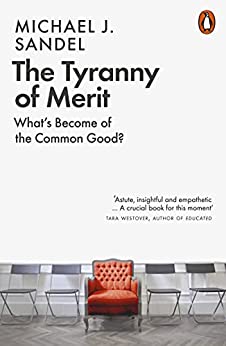Why I Picked This Book?
The Tyranny of Merit – What’s Become of Common Good the title of the book intrigued me. There has always been a debate in India regarding merit and most of the time it comes down to blaming “reservations” for eating into the share of meritorious people. In India “merit” is considered an individual achievement that is a result of hard work, intelligence, discipline, talent, and effort. And the general perception that the meritorious should have the first claim on higher education and jobs. This book challenges the notion of “merit” at least that is what one can interpret from the title. This book talks about merit in reference to America, and to know the thoughts of the author, I decided to read this one.
The Book
The Tyranny of Merit challenges the notion of merit as an individual accomplishment. The author says merit is not merely a result of the talent and hard work of an individual, instead there are many factors contributing to her/his merit. First and foremost, the privilege of being born into a rich family and getting all the support right from day one. The rich get the best of environment, education, tuition, coaching, books, and study materials. The others must either very work very hard to get or do not get all the above-mentioned support at all.
We live in a meritocracy, we are told, where hard work and talent are rewarded with success. Only, the game is rigged. All the stats show that the wealthier your parents, the more likely you are to “succeed” – which is to say, enjoy a top job or high wage
Meritocracy creates an environment where people believe that those who reach the top or are “successful” are so because of their own hard work and talent and those who are left behind are not good enough to reach the top or be successful. The people who were left behind in the race of meritocracy also started to feel that they are not good enough on the other hand the successful tend to get arrogant. This creates a sense of unrest among the ones who are left behind in the race, which is most of the population because only a few reach the top.
There are certain jobs and professions which are considered a result of merit, which means only meritorious people can get these jobs. The focus is on how much one earns in a particular job rather than how important/impactful a job is and what is its contribution to society. An example is a teacher, a sanitation worker, and an investment banker. The work of teachers and sanitation workers is important and has more impact than an investment banker on the common good of society and thus one is considered more successful than the other. The author argues meritocracy takes away the dignity of work, people doing work that has more impact on society are sometimes not considered successful.
In an unequal society, those who land on top want to believe their success is morally justified. In a meritocratic society, this means the winners must believe they have earned their success through their own talent and hard work.
One strong argument in favour of merit is that it promotes equality. The admissions to colleges or recruitment for jobs should be based on merit. This way whosoever fits the criteria or clears the exams should get admission or jobs. The author says that the discussions and debates are not about meritocracy, but about how to achieve it. As per the author the whole idea of meritocracy and sorting people as “winners” and “losers” is flawed and is creating a lot of resentment among the people.
If everyone who works hard can be expected to succeed, then those who fall short have no one to blame but themselves, and it is hard to make the case for helping them. This is the harsh side of meritocracy.
The general perception across the world is that meritocracy is a good thing, as it gives chance to the most deserving. Merit is something everyone should strive for and those who make it, is because of hard work and talent and those who can’t, is because they did not put in that much effort. The author breaks this perception with many thought-provoking arguments backed with data. It will make you think all over again about merit and meritocracy.
An interesting and informative read. It breaks so many myths pertaining to merit and meritocracy and gives us an insight about how actually it works. Makes you think and question your understanding about merit.
About The Author
Michael J. Sandel teaches political philosophy at Harvard University. His books What Money Can’t Buy: The Moral Limits of Markets, and Justice: What’s the Right Thing to Do? were international best sellers and have been translated into 27 languages. Sandel’s legendary course ‘Justice’ was the first Harvard course to be made freely available online and on television and has been viewed by tens of millions of people. His lecture tours have taken him across five continents and packed such venues as St. Paul’s Cathedral (London), the Sydney Opera House (Australia), and an outdoor stadium in Seoul (S. Korea), where 14,000 people came to hear him speak.
Our Verdict
The Tyranny of Merit is a must-read for everyone to understand what constitute merit. It is an important read to undestand whether the system of meritocracy is actually fair and promote equality as it claims to do? An insightful and eye-opening read.
